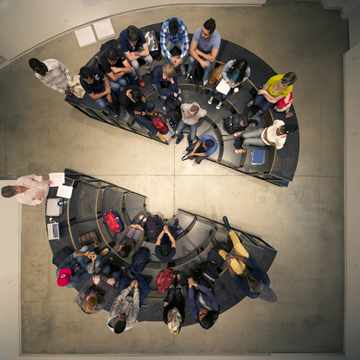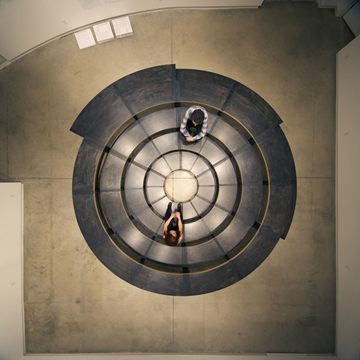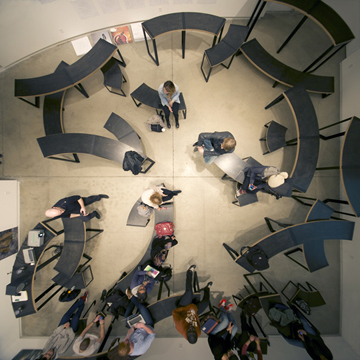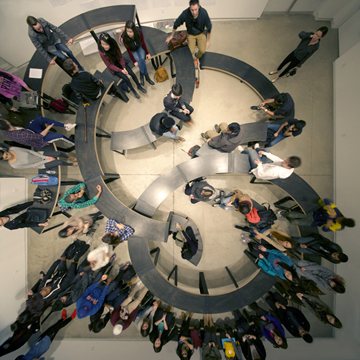
Saturday, November 22, 2014
1 – 6PM
This hybrid event is part colloquium, part workshop, and part experiment.
It is a support structure for the exchange of ideas.
The event is FREE and open to the public.




Saturday, November 22, 2014 | 1 – 6PM
Blackwood Gallery, University of Toronto Mississauga
To register for this event, email blackwood.gallery@utoronto.ca by Thursday November 20th.
A shuttle bus will depart Mercer Union (1286 Bloor St. W) at 12:30pm, and return at 6:30pm.
Snacks and refreshments will be provided.
If capitalism has produced two forms of property, one owned by the state (space of public authority) and the other owned by private citizens (private property), then public space is always an appropriation of one of these. Insofar as public space is political, that appropriation involves the construction of a physical space in which the paradoxical reality of capitalist society is rendered sensible.
- Adrian Blackwell, 2014
Adrian Blackwell’s Furnishing Positions explores the paradoxical relationship between publics and space through three different structures: a sculpture consisting of thirty pieces of furniture, reconfigured over twelve weeks to test the social effect of different spatial forms; a broadsheet series that interrogates six paradoxes of public space through artwork and texts by twelve contributors from diverse disciplines; and now, a set of conversations that test these ideas with an assembled public in the sculpture.
Furnishing Positions: Conversations brings together the contributors to the broadsheet series in order to test the ideas developed within its artworks and texts in dialogue with other contributors and an assembled public. The event is structured through two conversations. The first will function as a sequence of short monologues, in which each of the broadsheet contributors will present their ideas in turn. The second conversation will involve contributors and the assembled public and will be an opportunity to connect and relate these discreet provocations. Between the two conversations, there will be a break, during which time the assembled public will reconfigure the sculpture for the second half of the event.
This event is part of the exhibition FALSEWORK, curated by Christine Shaw and on view until December 7th, 2014. For more information on the exhibition, click here.
Adrian Blackwell is an artist, designer, and urban theorist whose work focuses on the relation between physical spaces and political economic forces. His artwork and designs have been exhibited at artist-run centres and public institutions in Canada, the U.K., the U.S., and China. In Spring 2014 he showed Circles Describing Spheres in if I can't dance to it, it's not my revolution at Haverford College, Pennsylvania and Getting Rid Of Ourselves at OCAD University’s Onsite Gallery. His current writing examines the polarities of global neoliberal urbanization, using Shenzhen as a case study. Recent publications include “Forms of Enclosure in the Instant Modernization of Shenzhen” in Volume and “What is Property? Notes on the Topology of Land as the ‘Historical Precondition’ and ‘Permanent Foundation’ of Capitalist Architecture,” in the Journal of Architectural Education. He has been a visiting professor at Harvard’s Graduate School of Design and is an assistant professor at the University of Waterloo School of Architecture. He was a member of Toronto’s Anarchist Free School and the Toronto School of Creativity & Inquiry and is currently an editor of the journal Scapegoat: Architecture | Landscape | Political Economy.
Eric Cazdyn is Distinguished Professor of Aesthetics and Politics at the University of Toronto (Centre for Comparative Literature and the Department of East Asian Studies), where he teaches courses on critical and cultural theory, psychoanalysis, Marx and Marxism, Deleuze, film and video, architecture, modern literature, and modern Japan. He is the author of the following books: The Already Dead (Duke, 2012), After Globalization (with Imre Szeman, Wiley-Blackwell, 2011), The Flash of Capital: Film and Geopolitics in Japan (Duke, 2002); and editor of Trespasses: Selected Writings of Masao Miyoshi (Duke, 2010) and Disastrous Consequences (South Atlantic Quarterly special issue, 2007). His most recent book, Nothing: Three Inquiries into Buddhism and Critical Theory (with Marcus Boon and Timothy Morton), will be published in 2015 by The University of Chicago Press. Cazdyn is also a filmmaker, and his films have been screened and performed in Japan, Canada, the U.S., Europe, and, most recently, in the U.K. as part of a two-week residency at The Cube Microcinema (Bristol) with Eric Chenaux.
Greig de Peuter is Assistant Professor in the Department of Communication Studies at Wilfrid Laurier University. He researches the contested political economy of media and cultural production, with an emphasis on work, labour, and employment. He is currently collaborating with Enda Brophy and Nicole Cohen on a multi-country study of precarious labour politics in creative industries. His most recent book, co-authored with Nick Dyer-Witheford, is Games of Empire: Global Capitalism and Video Games (University of Minnesota Press, 2009). His writing has appeared in The Fibreculture Journal, Journal of Communication Inquiry, Journal of Cultural Economy, and several anthologies. His article with Cohen and Brophy, “Interns, Unite! (You Have Nothing to Lose—Literally),” received the 2013 Canadian Association of Journalists/Communication Workers of America—Canada Award for Labour Reporting. He has been active in collectively run autonomous education and curatorial projects, including the Toronto School of Creativity & Inquiry (2005-2010), and, currently, Letters & Handshakes.
Karen Houle is an Associate Professor of Philosophy at the University of Guelph, and adjunct graduate faculty in the School of Fine Art and Music. Her areas of specialization are political theory, ethics, environmental philosophy and feminist thought. She co-edited (with Jim Vernon) Hegel and Deleuze: Together Again for the First Time (Northwestern, 2013). Her monograph, Responsibility, Complexity and Abortion: Toward a New Image of Ethical Thought (Lexington Books, 2013) came out at the end of last year. She is the translator of a book on improvisation (forthcoming, PS Guelph, September 2014) called Lê Quan Ninh: Abécédaire d'une expérience. She has published numerous academic and non-academic articles on topics ranging from animal tracking to Foucault, from watershed ecology to Derrida, from canoe flotillas to Irigaray, from rape to Steve Reich. She is also the author of two books of poetry: Ballast (House of Anansi, 2001) and During (Gaspereau, 2008). In the Fall 2014 she will be the inaugural Eastern Comma Writer-in-Residence at North House, rare.
Mary Lou Lobsinger’s writing and research focus on the history and theory of contemporary architecture and urbanism. Lobsinger’s publications can be found in Grey Room, Werk, Daidalos, Journal of Architectural Education, Thresholds, Architecture+Ideas, Scapegoat, Transmissions,and in various anthologies such as A Second Modernism: MIT, Architecture and the “Technosocial” Moment, Atomic Dwelling: Anxiety, Domesticity, and Postwar Architecture, Architectural Periodicals in the 1960s and ’70s, Import-Export: Postwar Modernism in an Expanding World, 1945-1975, Le Città visibili, Concrete Toronto, Italian Cityscapes: Culture and Urban Change, and Anxious Modernism: Experimentation in Postwar Architectural Culture. She has two current book projects, the completed Realist Impulse (on postwar Italian architectural discourse), and one entitled Neo-avant-gardism and the Politics of Post-materialism. Lobsinger is also completing a video project presently titled Urban Economic Motor. She is Associate Professor of History and Theory of Architecture at the University of Toronto’s John H. Daniels Faculty of Architecture, Landscape, and Design.
Dylan Miner (Métis) is Associate Professor at Michigan State University, where he coordinates a new Indigenous Contemporary Art Initiative. He holds a PhD from The University of New Mexico and has published more than fifty journal articles, book chapters, critical essays, and encyclopedia entries. In 2010, he was awarded an Artist Leadership Fellowship from the National Museum of the American Indian (Smithsonian Institution). Since 2010, he has been featured in more than thirteen solo exhibitions and been artist-in-residence at institutions such as the School of the Art Institute of Chicago, École supérieure des beaux-arts in Nantes, the Klondike Institute of Art and Culture, Rabbit Island, Santa Fe Art Institute, and various universities. His artwork has been the subject of articles or reviewed in publications including ARTnews, Canadian Art, c magazine, Indian Country Today, First American Art Magazine, The Globe and Mail, The Guardian, Måg Magazine (Norway), and The Chicago Sun-Times, among others.
Paige Sarlin is an artist, scholar, and political activist. She holds a PhD in Modern Culture and Media from Brown University and an MFA in Film/Video/New Media from the School of the Art Institute of Chicago. Her feature-length documentary film, The Last Slide Projector, premiered at the Rotterdam International Film Festival in 2007. From 1999 to 2010, she was an active participant in 16Beaver Group in New York City, a platform for the discussion of the intersection of art and politics. Her artwork has been exhibited internationally, and her writings have been published in October, Re-Thinking Marxism, Reviews in Cultural Theory, The Journal of Aesthetics and Protest, Scapegoat, and Framework: A Journal of Film and Culture. She is at work on a book-length manuscript entitled Interview-Work: The Genealogy of a Media Form. She is an Assistant Professor in the Department of Media Study at University at Buffalo, SUNY.
Scott Sørli’s trans-disciplinary practice concerns itself with moments when form and matter engage the economic and political forces that produce the city. He is co-founder of convenience, a window gallery that provides an opening for art that engages, experiments, and takes risks within the architectural, urban, and civic realms. He is also chair of Toronto’s peace subcommittee of the Nathan Phillips Square Community Advisory Committee. Sørli has taught architecture at several institutions, most recently in Jakarta, Indonesia; a book and exhibition on the work of the Inundation research studio conducted there will be published in Fall 2014.
Kika Thorne, artist, filmmaker, and curator, was a co-founder of she/TV; participated in and documented the sculptural protests of the Toronto-based October, February and April Groups; helped found the Anarchist Free Space & Free School in Toronto's Kensington Market; and in her role as curator for VIVO Media Arts Centre helped instigate SAFE ASSEMBLY, a fourteen-day collective program and gathering to express dissent against the effects of the 2010 Winter Olympic Games in Vancouver. Thorne has exhibited extensively, including projects at e-flux, Kino Arsenal, and Forum Expanded, Berlin; Murray Guy, New York; The Apartment, Access, Contemporary Art Gallery and Vancouver Art Gallery, Vancouver; and Pleasure Dome and the Justina M. Barnicke Gallery, Toronto. Her room-sized tensile sculptures were the focus of The WILDcraft, a solo exhibition at the Art Gallery of Windsor. She received her MFA from the University of Victoria, and she is currently working towards a PhD in Studio Practice at York University, Toronto.
cheyanne turions is an independent, Toronto-based curator and writer who holds a degree in Philosophy from the University of British Columbia. Most recently she co-curated (with Kim Simon) the series Canadian Ecstasy with poet and performance artist Ariana Reines at Gallery TPW and reviewed the Kuwait Pavilion at the Venice Biennale of Architecture for C Magazine. She is also the director of No Reading After the Internet (Toronto), and sits on the Board of Directors for the journal Fillip and the Canadian Filmmakers Distribution Centre. She was the Shop Manager/Curator at Art Metropole from 2012-2014 and is now a part of the organization's Lifetime Membership. Currently she is a member of the co-creative team for the Art and Society theme within the Cities for People project.